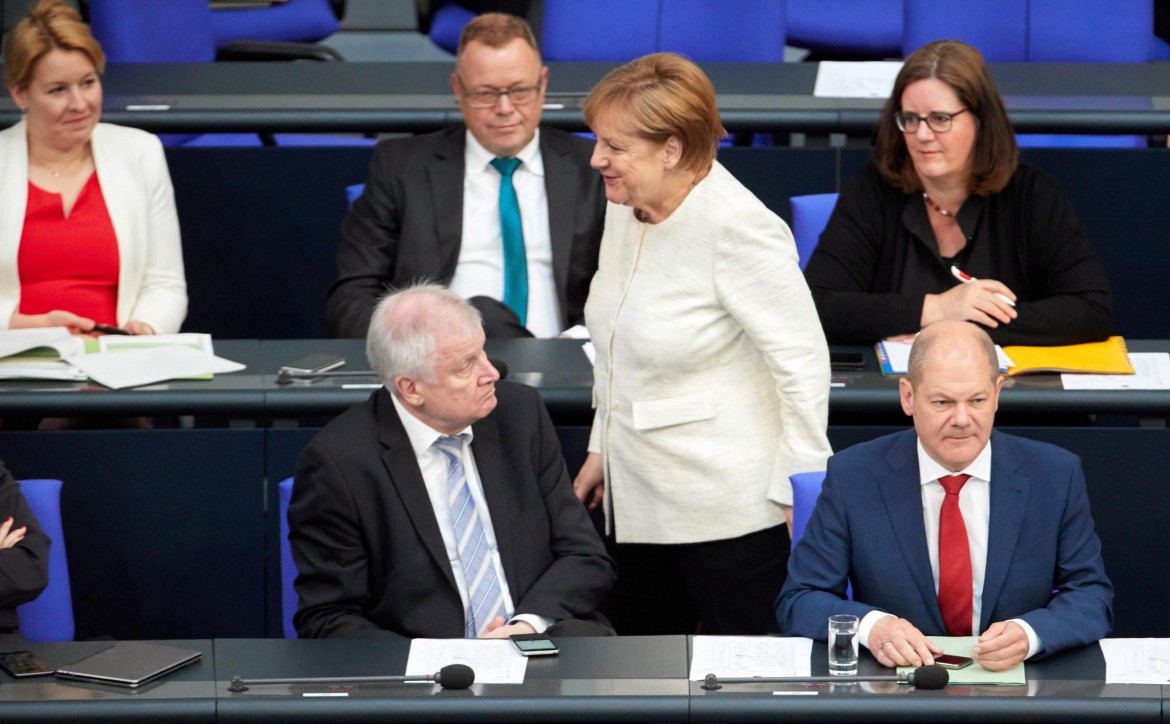Commentary
The Merkel-Seehofer ‘compromise’ is a cover for national brutality
It is neither a solution that would preserve the ‘spirit’ of the EU, which now exists nowhere but in the rhetoric of the Chancellor; nor is it the unilateral and immediate refusal of entry to refugees that the Bavarian leader, touting his brand-new border police force, is boasting of. It is a deception, and it shows.

A show of smoke and mirrors, a fiction, a cornucopia of lies: the “compromise solution” reached Monday night by Angela Merkel and Horst Seehofer to save Germany’s government coalition is all of these things and more.
What it definitely is not is what the two protagonists are trying to pass it off as: i.e. a victorious affirmation of each of their two points of view. It is neither a solution that would preserve the “spirit” of the EU, which now exists nowhere but in the rhetoric of the Chancellor; nor is it the unilateral and immediate refusal of entry to refugees that the Bavarian leader, touting his brand-new border police force, is boasting of. It is a deception, and it shows.
Any migrant who crosses the German border will be locked up in “centers” along the border, which, despite being on German soil, will not be in Germany from a legal point of view. From these “non-places,” once their asylum applications are rejected, they will be sent back, in accordance with the now-set-in-stone Dublin agreement, to the European country where they made their “first entry” into the Union. This will have to happen on the basis of agreements with the respective entry countries—which, in the most critical cases, such as Austria and Italy, are not even in the cards.
This tortuous bureaucratic and administrative cover for national brutality is the product of an impressive number of individual weaknesses. The Bavarian CSU could not break with Merkel’s national CDU, on pain of its (almost complete) irrelevance—as not even a political juggernaut like Franz Joseph Strauss in the ‘70s could manage to get it to cross the boundaries of its region and compete with the CDU in the rest of the country. The Chancellor, in turn, could not separate herself from her Bavarian cousins without suffering a fierce, and possibly fatal, onslaught from the right wing of her own party, and from those (many) who are nurturing their displeasure at her interminable reign.
And what of the SPD? If the party with this name still exists at all, the fear of new elections, however unlikely they are, seems to be enough to silence them. There really was no need for grueling negotiations and a rambling “government contract” if they were going to show such a degree of utter submissiveness. It has not been that long since the then-secretary of the Social Democrats, Sigmar Gabriel, called such “centers” as were agreed on an outrage and unacceptable. The Grand Coalition lives on, but the political balance has profoundly changed. The axis has shifted decisively to the right.
In any case, from the two liars involved, Interior Minister Horst Seehofer is the one lying less. The decision taken late at night in Berlin is certainly not a European decision. Behind the veil of legal fiction that will push the sorting and expulsion of migrants ostensibly outside German territory, this is an all-German national choice. In itself, it legitimizes the claims to a similar sovereign will in other countries, whose governments, moreover, are chomping at the bit. The countries of “first entry” will consider themselves relieved of any humanitarian obligation at their southern borders, and they are already threatening—starting with Vienna—to close down the northern borders as well, in order to prevent the return of those who are rejected in the new no man’s land invented and governed by Berlin. Nationalisms reinforce each other when they clash, as history should have taught even the dimmest of observers. The barricades that the CDU has tried to prop up will tumble down disastrously.
Even more, according to the fanciful story that Merkel is trying to peddle to European public opinion, she had to compromise with her interior minister “to save the Schengen area.” However, it is quite clear that it is precisely free movement between EU countries that will be dealt a blow by this “compromise,” with grim consequences. It will be no surprise if we will soon be faced with diverse interpretations of border controls, which will also involve EU citizens. The “national solutions” will only multiply, more or less disguised or out in the open.
The political response to migration flows in Europe is only the most visible, and demagogically exploitable, of the conflicts that are tearing through the Old Continent. But it is certainly not the main problem, or even a true emergency nowadays. In fact, the dramatization of this theme is hiding a copious amount of settling of scores between the different nation-states belonging to the Union, and the internal political forces fighting for power in each of them.
On account of its central and hegemonic position, Germany has been trying, for better or worse, to keep alive a strong European perspective—but it has tied it too closely to its own economic and ideological dogma, and has thus ended up weakening and discrediting it. Externally, it has fomented the resentment of debtor countries affected by austerity policies, and internally, it has allowed this resentment to be portrayed as a threat to the interests of German citizens, who have begun to turn to nationalist and xenophobic parties, first and foremost the AfD. It was the latter’s pressure that finally led to this miserable narrow compromise between Merkel and Seehofer, with migrants and Europe both on the losing side.
Originally published at https://ilmanifesto.it/nella-notte-berlinese-una-decisione-non-europea/ on 2018-07-04
